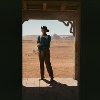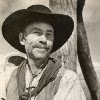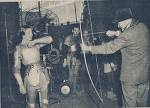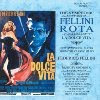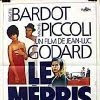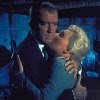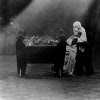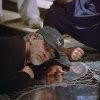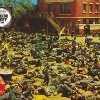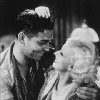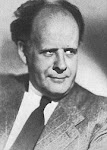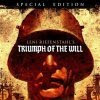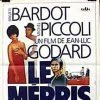I got this gem on DVD in the remaindered bin, four for $20 or something like that. Directed by Aleksei Balabanov, it's the flipside of Eastern Promises being, in part, a satirical examination of the Russian mobster milieu just as the David Cronenberg film was a meditation on "family" values and the moral code of the amoral hoodlum. In a prologue, Balabanov has a Russian history teacher explaining how the nation became a kind of hybrid capitalism in which one has to have a scorecard to tell the villains from the villains. The new Russian oligarchy consists of oil-rich former communists and many levels of thugery. My guess is that as the unlikely protagonist pals who guide us, clumsily, through their subcultural miasma are soon identified as soldiers for a "mustachio Pete"-type suburban crime boss with little or no class, they're definitely bottom feeders.
They're also right out of Pulp Fiction and its prologue, Reservoir Dogs. In the former, we were treated to the "banality of evil" in the exchanges between John Travolta and Samuel L. Jackson (discussing, for example, why the French don't have "Quarter Pounders" as they kill a little more time outside the apartment of their "hit"). In the latter, there is a lot of seemingly gratuitous violence meant to scare the be-Jebus out of you, but done with wry undertones (imagine Michael Madsen...DANCING! as a rookie cop goes up like James Cagney at the end of White Heat). Balabanov's script is not half so clever, but it's got plenty of laughs and plenty of the same audacity.
The game of the title is a variant of "Russian roulette," the only difference being that the brothers Sergei and Simon, the Mutt and Jeff duo who replace Travolta and Jackson, have stacked the deck -- er, cylinder -- not just putting one bullet in, but informing their rival gang victim he's got to keep trying. These two are "charmingly" played, incidentally, by Aleksei Panin and Dmitri Dyuzhev. There's a lot of mix-up, double- and triple-cross, and to-do with the McGuffin: identical cases containing American dollars (who wants rubles?!) and two big bags of heroin. Meanwhile, the bodies pile up; one particularly gruesome shoot-out occurs in a morgue-like place where a big pile of dead men and women form a kind of holocaustic background.
The film is marred by grinding, monotonous rock music which seems to be rheostated to maximum volume during the seemingly endless wandering of the nasty brothers from one part of Moscow to another, but the prologue teacher's explanation of how the mafia became the leadership and how the leadership became the mafia is shown at the very end, when the not so dynamic duo occupy a high-rise office with a view of the Kremlin in a "straight" business that has them in Armani suits and answering to...no, not really, the Mustachio Pete's fat boy son, all grown up now and twice as sinister as his dad. What a hoot! I loved it.
Wednesday, August 13, 2008
Tuesday, August 5, 2008
Bad Education?
When HBO Documentaries are good, they are sometimes great, as is the case of their recent 80-minute Baghdad
But can you actually imagine two male high school seniors in the U.S. openly kissing each other on the cheek -- three to four times -- as an everyday greeting or parting? They would be stigmatized, made the subject of ridicule, and driven, possibly, to the Krafft-Ebbingesque conclusion of Gus Van Sant's Elephant, where the Colombine-like school shoot-out follows a scene of the teen assassins showering together.
In Baghdad High, two of the boys in particular seem almost mystically (think of Rumi's school) entangled, Ali and Mohammed. When one, Ali, escapes the unpredictable violence and hellish life of Baghdad (imagine draining your car of gas in order to power a generator for light) for the peace and quiet of Kurdish-held ErbilBaghdad
I was left to wonder -- and when was the last time you saw a movie that made you think? -- if the filmmakers hadn't shown us what might be called the Balkanization of the Mideast. By witness of so much violence at such a young age, these four boys may grow up to be men who think violence is acceptable and, nursing old wounds, turn into tomorrow's terrorists. There was warmth in the boys, but it grew from their naive fascination with the camcorders and their play-making, rough stuff, braggadocio, &c. There was also a hopelessness, resentment, and perhaps insensitivity.
These suspicions are only confirmed by interviews with the adults: one of the boy's mothers, a burka-headed, careworn woman, says Saddam should not have been given a trial, just execution, "An eye for an eye and a tooth for a tooth." She actually said that! No matter that Gandhi said that if we all took an eye for an eye, everyone would be blind. I can almost imagine her reply: "Gandhi didn't know Saddam Hussein."
When told Saddam had just been hanged, she reiterates, "That wasn't enough for him." What on earth would she have had the temporary government do, cut off his fingers, one each day? Then his toes, one a day. Then the feet and hands for four days, &c.
The filmmakers did something novel and remarkably effective: they lent each of four seniors camcorders and told them to film their own lives and the those of their classmates. The four young men shot their world for roughly a year, from 2006 to 2007, and then the documentarians edited the results, cutting back and forth from one poignant student’s story to another. Make no mistake about it: Iraqi boys aren’t much different from those at home when it comes to musical tastes: one is shown memorizing a song by Madonna "because I like it," while some of the others seem most absorbed by rap and hip-hop.
Yet there is a major cultural difference between Iraqi teens and their American peers, a cultural difference that is striking in the documentary. The Iraqis seem more affectionate toward others of their sex. In fact, several long shots show them not only embracing but kissing each other repeatedly on the cheeks. True, grown men in Islamic countries do the same, and even Mexicans are famous for their abrazos (lit. "to arms"), which some wags yet contend was a custom designed to keep the other guy's hands off his pistols.But can you actually imagine two male high school seniors in the U.S. openly kissing each other on the cheek -- three to four times -- as an everyday greeting or parting? They would be stigmatized, made the subject of ridicule, and driven, possibly, to the Krafft-Ebbingesque conclusion of Gus Van Sant's Elephant, where the Colombine-like school shoot-out follows a scene of the teen assassins showering together.
In Baghdad High, two of the boys in particular seem almost mystically (think of Rumi's school) entangled, Ali and Mohammed. When one, Ali, escapes the unpredictable violence and hellish life of Baghdad (imagine draining your car of gas in order to power a generator for light) for the peace and quiet of Kurdish-held Erbil
I was left to wonder -- and when was the last time you saw a movie that made you think? -- if the filmmakers hadn't shown us what might be called the Balkanization of the Mideast. By witness of so much violence at such a young age, these four boys may grow up to be men who think violence is acceptable and, nursing old wounds, turn into tomorrow's terrorists. There was warmth in the boys, but it grew from their naive fascination with the camcorders and their play-making, rough stuff, braggadocio, &c. There was also a hopelessness, resentment, and perhaps insensitivity.
These suspicions are only confirmed by interviews with the adults: one of the boy's mothers, a burka-headed, careworn woman, says Saddam should not have been given a trial, just execution, "An eye for an eye and a tooth for a tooth." She actually said that! No matter that Gandhi said that if we all took an eye for an eye, everyone would be blind. I can almost imagine her reply: "Gandhi didn't know Saddam Hussein."
When told Saddam had just been hanged, she reiterates, "That wasn't enough for him." What on earth would she have had the temporary government do, cut off his fingers, one each day? Then his toes, one a day. Then the feet and hands for four days, &c.
Subscribe to:
Posts (Atom)
+(2).jpg)
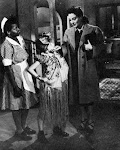.jpg)
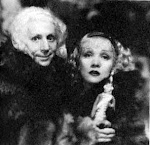+(3).jpg)
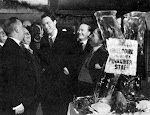+(4).jpg)
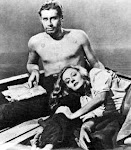+(7).jpg)
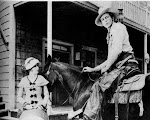.jpg)
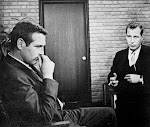+(6).jpg)
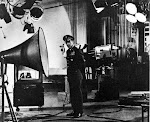+(5).jpg)
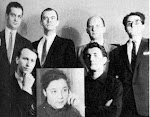.jpg)

